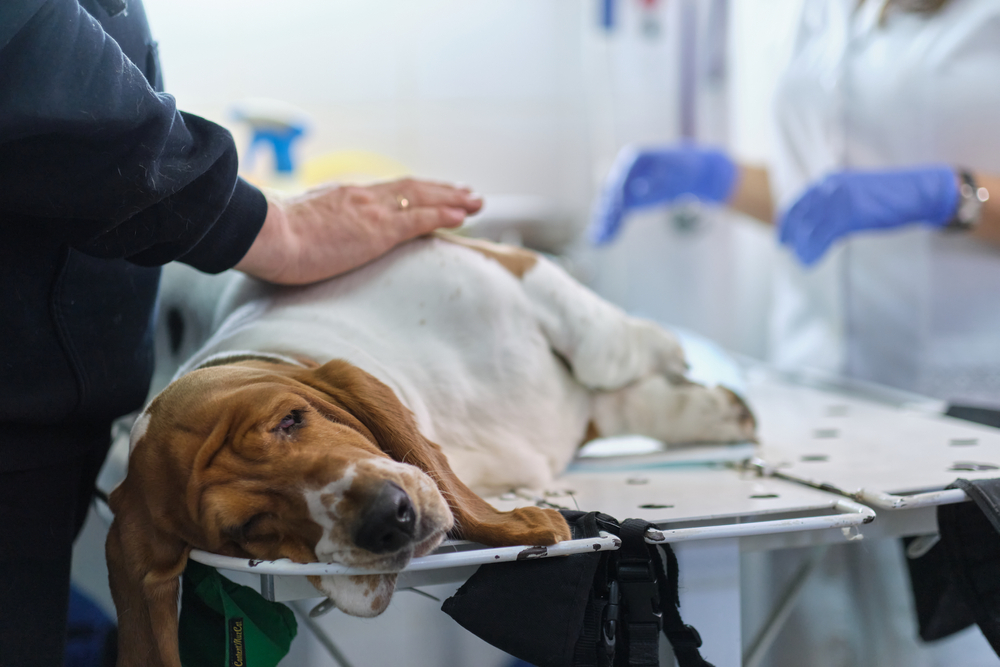In this article
Seizures can be scary to witness in people and pets alike. Changes in brain activity can trigger a seizure in a dog, though the reasons for those changes vary. Knowing how and why one can occur can better prepare you if you ever face this situation with your own dog.
Read on to learn how to treat and prevent seizures and what to do to keep you and your pet safe in the event that one occurs.

What Is a Seizure?
A seizure causes a temporary disruption of normal brain function. This abnormal brain activity is involuntary and results in uncontrollable muscle activity. A grand mal seizure causes generalized convulsions and unconsciousness due to widespread abnormal electrical activity in the brain. Focal seizures occur in one area of the brain only and may appear as “fly-biting,” “chewing gum fit,” or eyelid, lip, or ear twitching.

What Causes a Seizure?
The causes triggering a seizure in dogs include:
- Liver disease
- Kidney failure
- Brain tumors
- Brain trauma
- Low blood sugar
- Low blood calcium
- Toxins
- Excitement
- Falling asleep
- Waking up
Seizures may also be idiopathic, meaning they have no known cause but can be inherited in some dogs. Multiple seizures occurring singly or in clusters at predictable or unpredictable times are collectively known as epilepsy. Idiopathic epilepsy is the most common form of seizures in canines and typically develops in dogs from 6 months to 6 years of age. Epileptic dogs may behave normally in between seizure activity. Breeds predisposed to epilepsy include Schnauzers, Collies, Basset Hounds, Cocker Spaniels, Labrador Retrievers, and Golden Retrievers.

What Are the Signs of a Seizure?

Seizures often occur in three stages: the pre-ictal (or aura) phase, the ictal phase, and the post-ictal phase. Pre-ictal is the phase prior to a seizure, when you may notice behavioral changes in your dog. The ictal phase is the actual seizure itself. The post-ictal phase is the period of time when your dog is recovering after the seizure and may seem confused or disoriented. These phases are briefly outlined in this table:
| Phase | Signs | Time |
| Pre-ictal/Aura | Altered behavior signs include:
|
Signs may last a few seconds to a few hours. |
| Ictal | Signs can vary from mild changes:
|
The seizure may last a few seconds to several minutes. Do note that status epilepticus occurs when a seizure continues for more than 5 minutes and is considered a medical emergency. |
| Post-ictal | The signs include:
|
This phase is variable, lasting minutes to hours. |
Seek veterinary advice if you’re concerned about your pet’s well-being.
If you need to speak with a vet but can't get to one, head over to PangoVet. It's our online service where you can talk to a vet online and get the advice you need for your dog — all at an affordable price!

How Do I Care for a Dog That Is Having a Seizure?
Safety for you and your dog is vital. If your dog is having a seizure, keep your hands and fingers away from their mouth. The involuntary movements may lead to an accidental bite injury. Dogs will not swallow their tongue during a seizure, so that isn’t a concern. Be sure your dog is away from stairs or heights so they cannot fall farther down and get hurt.
Move away objects that may fall on and injure your dog during the convulsions. It may be tempting to comfort your dog during a grand mal seizure, but they are unaware of what is happening. Some dogs in the post-ictal phase may react aggressively, so you must exercise caution to avoid injury.
Making notes of the frequency and duration of seizures can be helpful information for your veterinarian. Recording a video of the seizure event may also be useful.
If this is the first time that your dog has had a seizure, scheduling an appointment with your veterinarian is recommended. They will gather a complete medical history and perform a thorough physical exam. They may recommend testing, such as blood work, urinalysis, X-rays, and an electrocardiogram, to rule out organ dysfunction. Other recommended testing may include computed tomography, magnetic resonance imaging, or a sampling of the cerebral-spinal fluid to pinpoint any abnormalities, including brain tumors, infection, or head trauma.

How Are Seizures Treated?
Depending on the frequency of seizures, your dog may not need medication unless the seizures occur more than once a month, occur in clusters (one right after another), or are severe and prolonged.
- Phenobarbital
- Potassium bromide
- Zonisamide
- Levetiracetam
Combination therapy, or more than one medication given at a time, may be prescribed to help control seizures. Once therapy is started, your dog will likely need to continue the medication for the rest of their life. If the medication is stopped abruptly, it can worsen the intensity or frequency of seizures.
Diazepam may be kept at home and administered rectally as an emergency drug for dogs with cluster seizures.

Tips for Keeping Your Dog Safe and Healthy
- Remain calm during the seizure.
- Stay safe by keeping your hands away from a seizing dog’s mouth.
- Ensure that your dog is not at risk for falling down stairs.
- Move objects that may fall on and injure your dog.
- Keep a journal and/or video log of all seizure activity.
- Schedule an appointment with your veterinarian after the first seizure has occurred.
- Seek emergency treatment for seizures lasting over 5 minutes.
- Precisely follow all medication instructions as directed by your veterinarian.


Frequently Asked Questions (FAQ)
Is a Seizure Dangerous?
If a seizure lasts more than a few minutes or occurs one right after the other, it can lead to increased body temperature (hyperthermia) and brain injury. Prolonged seizures are a medical emergency and need to be treated right away. Status epilepticus can lead to death if it is not controlled.
Can I Stop Giving Seizure Medication to My Dog If They Haven’t Had a Seizure in a While?
No, abruptly stopping seizure medication may induce seizures. Carefully follow your veterinarian’s directions at all times.

Conclusion
Organ dysfunction, metabolic disturbances, head trauma, brain tumors, toxins, and changing brain activity or emotional state may all trigger seizures in dogs. Although concerning to witness, most seizures can be controlled with life-long medication therapy. Remember to remain calm, prevent your dog from falling down stairs or other heights, remove surrounding objects that can fall on and injure them, and keep your hands away from chomping jaws when a seizure occurs. Safety is vital!
Featured Image Credit: Przemek Iciak, Shutterstock






















